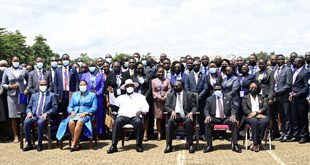
Kampala, Uganda | THE INDEPENDENT | Three judges of the Court of Appeal on Wednesday issued a judgment quashing the sentencing of four Muslim clerics and two others over offences which were never included on the charge sheet.
Judges Alfonse Owinyi-Dollo, who was until recently the Deputy Chief Justice, Elizabeth Musoke and Cheborion Barishaki ruled that the three judges of the International Crimes Division of the high court erred when they found Sheikhs Muhammad Yunus Kamoga, Siraje Kawooya, Murta Mudde Bukenya, Fahad Kalungi, Ssekayanja Abdulsalam and Kakande Yusuf guilty of terrorism.
In 2017, High Court judges Ezekiel Muhanguzi and Percy Tuhaise, and Jane Kiggundu sentenced Kamoga who was then the leader of the Jamuiat Da’awa Assalaafiya, a Tabliq Muslim sect and the three sheikhs to life imprisonment. The other two were sentenced to 30 years in prison.
Their trial and sentencing followed the shooting of two Muslim clerics, Mustapha Bahiga and Ibrahim Hassan Kirya in 2014 and 2015. Charges of Murder, attempted murder and terrorism were brought against the six and seven others who were acquitted.
However, the court found them not guilty of all the two counts of murder of Bahiga, and Kirya and attempted murder of Sheikh Haruna Jjemba, Prince Kasim Nakibinge, Sheikh Umar Swidiq Ndawula, Mahmood Kibaate and Najib Ssonko, but convicted them of terrorism.
Legal experts then wondered how the court could have found them guilty of terrorism yet it had exonerated them on murder and attempted murder charges based on the same evidence. Through their lawyers; McDusman Kabega, Fred Muwema, Allen Kagoya, Charles Nsubuga, Twaha Mayanja and Barbra Nalujja, the six appealed both the conviction and the sentence.
In their appeal, they laid down 10 grounds on which they requested the court to base on to quash the entire judgment. They argued that the court erred in law and fact by failing to evaluate the evidence on record and apply it to the law relating to the offence of terrorism.
They said that the judges relied on uncorroborated circumstantial evidence, convicted them on the evidence of circulating fliers and hearsay relating to wrangles in the Muslim community. The other point of contention was that the high court based its conviction on the same evidence which court based on to acquit them on murder and attempted murder.
In their the ruling, the judges said it was true that the high court based its conviction on an offence which was never part of the charge sheet. They reasoned that a person charged with a criminal offence may only burden him or herself with such particulars as are laid down in the indictment.
“Those particulars contain the facts which would reasonably inform that person of the case against him or her. When the prosecution presents those facts to him or her and he or she gives the relevant defence; it can be confidently said that he or she had a fair trial,” the 43 paged judgment reads in part.
It adds that when the prosecution does not present certain facts to that person and he or she does not give a defence to them yet the trial court pronounces itself on those facts in its judgement, it cannot be said that they had a fair trial.
“This is what happened in this case in regard to alleged acts of maiming. We, therefore, accept the submissions of counsel for the appellants that it was irregular for the learned judges to make findings on matters which were not set forth in the particulars in the indictment. We cannot accept the submission for the respondents that where the statement of the offence is given then the court may make findings on the facts not set forth in the particulars,” the three judges said in a judgment, written by Owinyi-Dollo.
They added that they were of the opinion that proceedings in which the accused is not told of his or her offence deprive him or her right to give defence in respect to each and every accusation against him. “Where an accusation is not outlined in an indictment, the charged person does not have to answer to it,” the judgment says.
The Charge of terrorism
The appeals court also disagreed with the conviction that Kamoga threatened to kill his former colleagues. During the trial, it was said that Kamoga and his co-accused, held several meetings in which they planned to kill Kirya, Bahiga, Nakibinge among others.
The court was also told that Kamoga and his acquaintances came up with a list of the people who should be shunned because of their danger to the Muslim Community. Two of the people who appeared on the flier were eventually gruesomely assassinated. However, in the Court of Appeal’s wisdom, there was little evidence to prove that Kamoga and his co-accused had either directly or by complicity uttered threats of murder or attacks against the seven persons named in the indictment.
“To our minds, therefore, nothing on these fliers could reasonably be interpreted as a threat to kill by the authors,” the court held.
On whether Kamoga and his people participated in any acts that resulted in the killing or threatening of people, the court found that there was enough evidence on record that there was a commission of acts of direct involvement or complicity in the threatened murder or attack on at least Mustapha Bahiga and Ibrahim Hassan Kirya.
“Having evaluated all the material on record, we reach the finding that the learned trial judges were right to go with the evidence given during the trial on oath… Therefore…we conclude that the first ingredients of the offence of terrorism contrary to section 7(1) and 2 (b) of the Anti-Terrorism Act 2002 was proved,” the judgement reads in part.
For the offence of terrorism to be proved also, the law states that there must be acts whose aim is to influence the government or intimidating the public or section of the public. The court also found that actions by Kamoga and his co-accused of uttering threats against the victims were for purposes of influencing other members of the Muslim Community to shun the victims such as Mustapha Bahiga and Ibrahim Kirya.
“The said appellants intended to achieve the shunning of the victims by others in their Muslim Community. Therefore, this ingredient was proved,” the judgement reads.
The court was also convinced that threatening Bahiga and Kirya was motivated by a religious agenda to achieve the religious shunning of the victims. “This was particularly relevant to the victims as Muslims clerics who had a following of students. Therefore, this ingredient too was proved.”
On whether their actions were indiscriminate another ingredient of the charge of terrorism, the court held that the actions of Kamoga and his co-accused were marked by careful distinction.
“A distinction was made against those who were considered to be the opposing Muslim clerics to those who were headed by the appellant… It appears that the learned trial judges were satisfied that the appellants had uttered the threats in issue in an indiscriminate manner; we have been unable to ascertain their precise reason why,” the judgement reads.
It adds that taking the literal meaning of the relevant words, the judges were satisfied that the intention of parliament in drafting the Anti-Terrorism Act 2002 was to legislate against a special type of offence namely terrorism.
“Acts of terrorism can also be covered by other offences under the law but under the relevant act, the acts of terrorism must have been the character or indiscriminateness in effect and the manner of their execution. As has been expounded above, there was no such indiscriminateness on the instant case,” the judgment reads.
Having explained that the judges failed to prove that Kamoga and others had committed terrorism acts, the court hence quashed both the conviction and sentence and ordered for their release. “The sentences imposed on the appellants arising from their respective convictions are also set aside. This conclusion makes it unnecessary to consider grounds 7,8,9 as regards sentence, the same having been set aside.”
********
URN
 The Independent Uganda: You get the Truth we Pay the Price
The Independent Uganda: You get the Truth we Pay the Price


